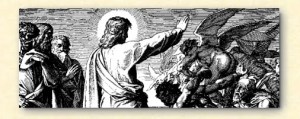Soon afterward he went to a town called Nain, and his disciples and a great crowd went with him. As he drew near to the gate of the town, behold a man who had died was being carried out, the only son of his mother, and she a widow, and a considerable crowd from the town was with her. Luke 7:11-12
Widows’ sons die every day. If the mother is blessed by extended family, not to mention other sons, she  will at least have shelter and food in exchange for watching the children or grinding the grain. If not, she will have to piece out a living on charity. The pressing nature of What will I do? crushes every other concern, even proper grieving, so on top of all her other problems is the burden of guilt: she is forced to worry about her own life even while grieving for his. Why could their fates not be reversed? Better for all concerned to let her go, let him live—take a wife and raise his children and continue the family line, as is proper and fitting. Sad and angry and worried, she follows the pitiful bier, having spent her last pennies for the bare minimum of a respectable funeral, with a few paid mourners and a drum.
will at least have shelter and food in exchange for watching the children or grinding the grain. If not, she will have to piece out a living on charity. The pressing nature of What will I do? crushes every other concern, even proper grieving, so on top of all her other problems is the burden of guilt: she is forced to worry about her own life even while grieving for his. Why could their fates not be reversed? Better for all concerned to let her go, let him live—take a wife and raise his children and continue the family line, as is proper and fitting. Sad and angry and worried, she follows the pitiful bier, having spent her last pennies for the bare minimum of a respectable funeral, with a few paid mourners and a drum.
Widows’ sons die every day, but this day would see a turnaround. As two “considerable crowds” meet at the city gate—his followers and her mourners—it’s not the dead son but the weeping mother who catches his eye. He raises a hand to stop the procession, and to her he says, “Don’t cry.”
It’s one of those statements that, from anyone else, would seem almost cruel, especially to the chief mourner. What do you mean, ‘Don’t cry’? I have every reason in the world to cry, and there’s nothing to be said about it. Shut your mouth and cry with me, or just move along.
But if she knows who he is (the crowd of eager rubberneckers behind him might have given her a clue), she would stop crying, her tears caught in her throat. He heals the sick but he can’t raise the dead. Can he? She knows her nation’s history, and remembers that Elijah, the greatest of prophets, raised a widow’s son: he stretched himself out on the boy’s lifeless body and cried aloud to Yahweh, three times.
Jesus puts his hand on the bier—really nothing but a plank carried by two men, signifying a poor man’s burial. Who is on the bier? A young man, that’s all we know. Perhaps a pious dutiful son or a casual jokey son—his mother’s joy or exasperation, either one, equally dead. And Jesus is speaking to a corpse. “I tell you . . .” Not crying aloud to the Blessed one, not placing mouth to mouth or heart to heart. Imagine the thoughts racing through the observers, especially the religious elite:
I (Who does he think he is?)
Tell (Tell?! What words can get through dead ears into a dead brain?)
You (Who is this ‘you’? That’s just a–)
“ARISE!”
Death is a mystery, both then and now. Some ancient cultures kept watch over the body for a certain number of hours in case the spirit returned to it (rumored to happen, though almost no one has actually seen this). Wise men of all cultures debated this most-common phenomenon: Does the spirit stay with the body, or how soon does it go, or is there a spirit, and can it return? In this particular case, all agree it’s not near-death that confronts Jesus at the gates of Nain—it’s death. The body and the spirit have parted company.
Was the spirit lingering nearby, or was it speeding toward the afterworld? In either case, the Son of Man’s voice darts out like a harpoon; with a word it captures the young man’s spirit and pulls it back to the lifeless body.
Arise: air surges into the stilled lungs; the flaccid chambers of the heart clench; a rush of blood to the brain revives its memories. Suddenly awake, the young man feels a hand close on his, lift it and place it in the last hand he remembers as life left him: Mother. All the busy little engines of his body, down to the last threadlike capillary and blood cell, charge back into operation. The broken connection is restored.
And awe fell over everyone.
For the original post in this series, go here.
Next>




